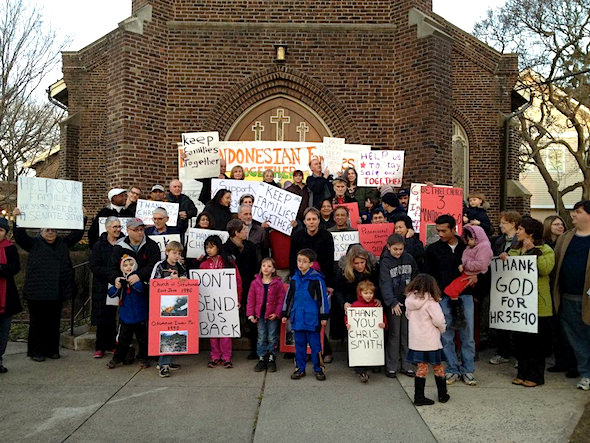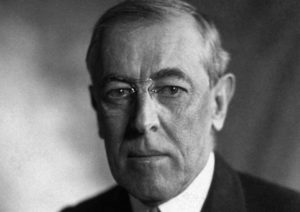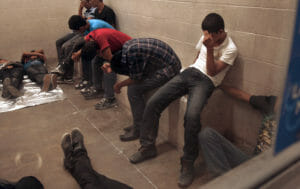Truthdiggers of the Week: Sanctuary Churches, Havens for Undocumented Immigrants
Despite serious risks, religious institutions across the U.S. are opening their doors to immigrants who fear deportation under the Trump administration.
Members of the Reformed Church of Highland Park, N.J., show support for undocumented immigrants. (Reformed Church of Highland Park / Facebook)
Since President Trump took office less than one month ago, fears of increased deportations at the hands of Immigration and Customs Enforcement (ICE) have spread across the nation. While many local governments have made headlines for pledging to remain sanctuary cities for undocumented immigrants, religious institutions have begun to open their doors as well.
Enter sanctuary churches—religious centers that risk prosecution to protect undocumented immigrants from ICE raids.
Immigration enforcement has been in the spotlight, particularly in the last few weeks. During his first few days as president, Trump signed an executive order “aimed at hardening the country’s domestic immigration enforcement apparatus,” according to The Intercept.
The order, “uses a broader definition of ‘serious crimes’ and includes anyone who has crossed the border illegally—a misdemeanor,” The New York Times reported.
Trump has since praised the “crackdown on illegal criminals,” a key component of his campaign platform. And while the number of ICE arrests have remained level, there are reports of immigrants with nonviolent records (who usually were an exception under Obama-era deportation policy) now facing deportation as a result of Trump’s executive order.
An example is Guadalupe García De Rayos, a mother of two, whose recent deportation sparked protests in Phoenix. The Guardian reported:
Guadalupe García de Rayos, a 36-year-old mother of two US citizens, was a non-violent felon who had for years complied with Immigration and Customs Enforcement (Ice) orders after being convicted of using a fake social security number to work.
But on Wednesday, when she went for her usual check-in, Ice agents took her into custody, separating her from her husband and children who were waiting outside.
Under a new executive order that President Trump signed on 25 January, García de Rayos had become a priority for deportation. The order states that undocumented immigrants should be deported if they have been charged with any criminal offense. The president said the order was needed “to ensure the public safety of the American people”.
Sanctuary churches are not a new concept. The Obama administration was responsible for massive deportations, and many churches offered protection to undocumented immigrants during President Obama’s time in office.
But in the wake of Trump’s election, “dozens of churches and other faith communities” are pledging to protect undocumented immigrants from deportation, according to NPR.
Like the local government officials who vow to continue sanctuary cities, religious leaders are guided by a sense of morality.
“We have to stand with the oppressed even if the law of the land sometimes doesn’t exactly coincide with the teachings of peace and justice and love found in Scripture,” Seth Kaper-Dale, pastor of the Reformed Church of Highland Park in New Jersey, told The New York Times.
The sanctuary churches protect immigrants who span religions and ethnicities. The Reformed Church of Highland Park, N.J., has opened its doors to five Indonesian immigrants who fear returning to their homeland because of religious persecution. The Shadow Rock United Church of Christ in Phoenix, shelters Sixto Paz, a father of three and an undocumented Mexican immigrant, who lives in fear of deportation under the Trump administration. And the First Unitarian Society in Denver is housing Mexican immigrant Jeanette Vizguerra, as well as her four children.
“[The] message that I would like to say to President Trump is, I’m just a mother who wants to work hard for her children and be with her family,” Vizguerra told Amy Goodman via a translator during a Democracy Now! interview. “I wish that you would think of the harm that you’re causing my children.”
Vizguerra continued:
[S]upposedly, I am a criminal because I drove without a license, because I had expired stickers on my car, because I had false documents to work and put food on the table for my children. But what should we call you, Mr. President Trump, when you have been evading taxes for years, when the way that you’ve been acting is not in keeping with good conscience?
Numerous other religious institutions have taken on the “sanctuary” title, although they do not yet have undocumented immigrants turning to them for help. And the phrase “sanctuary church” isn’t completely accurate, as synagogues and mosques also have begun to join the sanctuary movement.
Leaders from various religions are even coming together to plan coalitions to protect undocumented immigrants. These leaders also are calling upon their communities to aid the immigrants.
However, some communities don’t support the mission of sanctuary churches. Lincoln United Methodist Church, a sanctuary church in a Mexican-American neighborhood in Chicago, has been defaced with anti-immigrant graffiti. Its pastor, Emma Lozano, is determined to keep the church a sanctuary despite the pushback.
“We have to have courage right now,” the pastor told CNN. “Courage doesn’t mean you’re not afraid. It just means that the fear exists, but you have the will to carry on.”
Pastor Bill Jenkins of the United Methodist Church in Normal Heights, Calif., expressed a similar sentiment. “I’m making a lot of enemies, but I don’t care,” he told NBC San Diego.
Xenophobia from the local communities is only one threat affecting sanctuary churches—if ICE begins conducting raids, religious leaders may face harsh legal ramifications.
“For years, it’s been federal policy not to do immigration enforcement in churches and other ‘sensitive locations,’ such as schools, unless absolutely necessary,” NPR reported.
But that may change in the current atmosphere. Undocumented immigrants don’t have legal protections just because they are housed in a church, and anyone who knowingly harbors those immigrants could face years in prison.
Still, these risks haven’t stopped leaders of religious institutions from offering their protection.
“Is sanctuary brutally hard? Yes,” New Jersey pastor Kaper-Dale told NPR. “But it is a tool that we will use, if we’re forced by a brutal regime to use it.”
For their courage in the face of serious consequences and their compassion in a menacing political climate, we name sanctuary churches—and the leaders who run them—our Truthdiggers of the Week.
Independent journalism is under threat and overshadowed by heavily funded mainstream media.
You can help level the playing field. Become a member.
Your tax-deductible contribution keeps us digging beneath the headlines to give you thought-provoking, investigative reporting and analysis that unearths what's really happening- without compromise.
Give today to support our courageous, independent journalists.





You need to be a supporter to comment.
There are currently no responses to this article.
Be the first to respond.